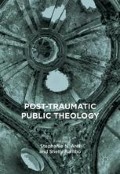Abstract
What is the trauma of belonging? Arguing that the trauma of belonging is fruitfully explored in non-Western contexts, I argue that postcolonial nations such as India experienced originary trauma as the emergence of two nations followed a colonial framework for national identity based on religious and communitarian difference. Belonging to a postcolonial nation, however, continues the originary trauma. Thus, “independence” from the colonial master created different channels for continuing trauma, including the trauma of belonging as a minority in one or the other nation. This essay adds to the burgeoning literature that tracks historical trauma and its present emanations to critique contemporary Eurocentric trauma studies. The essay also advances a proposal for an interdisciplinary engagement for trauma studies and theology.
Access this chapter
Tax calculation will be finalised at checkout
Purchases are for personal use only
Bibliography
Brown, L.S. 1995. Not outside the range: One feminist perspective on psychic trauma. In Trauma: Explorations in memory, ed. C. Caruth. Baltimore: The John Hopkins University Press.
Caruth, C. 1995. Introduction. In Trauma: Explorations in memory, ed. C. Caruth. Baltimore: The John Hopkins University Press.
Craps, S. 2013. Postcolonial witnessing: Trauma out of bounds. New York: Palgrave MacMillan.
Das, V. 2000. The act of witnessing: Violence, poisonous knowledge and subjectivity. In Violence and subjectivity, ed. V. Das, A. Kleinman, M. Ramphele, and P. Reynolds. Berkeley/Los Angeles: University of California Press.
Das, V. 2006. The figure of the abducted woman. In Political theologies: Public religions in a post-secular world, ed. H. De Vries and L.R. Sullivan. New York: Fordham University Press.
Felman, S. 1995. Education and crisis, or the vicissitudes of teaching. In Trauma: Explorations in memory, ed. C. Caruth. Baltimore: The John Hopkins University Press.
Gilroy, P. 2000. Between camps: Nations, cultures and the allures of race. London: Routledge.
Greedharry, M. 2008. Postcolonial theory and psychoanalysis: From uneasy engagements to effective critique. Basingstoke/New York: Palgrave MacMillan.
“How India and China explain the Holocaust to school Kids,” Monitoring, Exposing & Fighting Against Anit-Semitism and Racism website. http://www.anti-semitism.net/holocaust/how-india-and-china-explain-the-holocaust-to-school-kids.php
Kleinman, A. 1997. Social suffering. Berkeley: University of California Press.
Kleinman, A. 2000. Violence and subjectivity. Berkeley: University of California Press.
Kleinman, A. 2001. Remaking a world: Violence, social suffering and recovery. Berkeley: University of California Press.
Moon, P. 1998. Divide and quit: An eyewitness account of the partition of India. Delhi/Mumbai: Oxford University Press.
Nandy, A. 1983. The intimate enemy: Loss and recovery of self under colonialism. New Delhi: Oxford University Press.
Pandey, G. 2001. Remembering partition. New York: Cambridge University Press.
Radstone, S. 2007. Trauma theory: Contexts, politics, ethics. Paragraph 30(1): 9–29.
Sil, N.P. 2008. Postcolonialism and postcoloniality: A premortem prognosis. Alternatives: Turkish Journal of International Relations 7(4): 20–33.
Vries, H.D. 2006. Introduction. In Political theologies: Public religions in a post-secular world, ed. H. De Vries and L.R. Sullivan. New York: Fordham University Press.
Author information
Authors and Affiliations
Editor information
Editors and Affiliations
Rights and permissions
Copyright information
© 2016 The Author(s)
About this chapter
Cite this chapter
Abraham, S. (2016). Traumas of Belonging: Imagined Communities of Nation, Religion, and Gender in Modernity. In: Arel, S., Rambo, S. (eds) Post-Traumatic Public Theology. Palgrave Macmillan, Cham. https://doi.org/10.1007/978-3-319-40660-2_13
Download citation
DOI: https://doi.org/10.1007/978-3-319-40660-2_13
Published:
Publisher Name: Palgrave Macmillan, Cham
Print ISBN: 978-3-319-40659-6
Online ISBN: 978-3-319-40660-2
eBook Packages: Religion and PhilosophyPhilosophy and Religion (R0)

